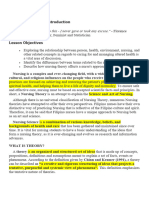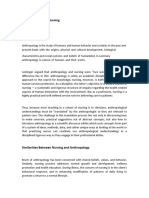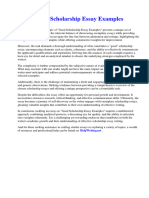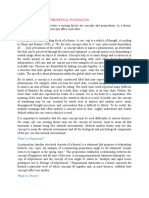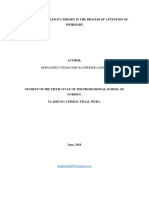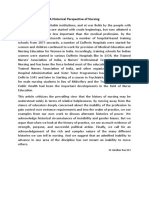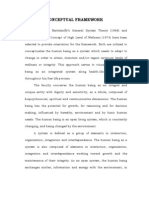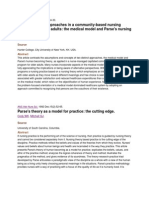0 ratings0% found this document useful (0 votes)
544 viewsCulturl Broker Theory Jezewski
Culturl Broker Theory Jezewski
Uploaded by
Lian Rodriguez-HallThis article describes the evolution of the middle-range substantive theory of culture brokering. The theory can guide the practice of nurses in situations where conflict is present in the health care interaction.
Copyright:
Attribution Non-Commercial (BY-NC)
Available Formats
Download as PDF, TXT or read online from Scribd
Culturl Broker Theory Jezewski
Culturl Broker Theory Jezewski
Uploaded by
Lian Rodriguez-Hall0 ratings0% found this document useful (0 votes)
544 views17 pagesThis article describes the evolution of the middle-range substantive theory of culture brokering. The theory can guide the practice of nurses in situations where conflict is present in the health care interaction.
Original Title
culturl broker theory jezewski
Copyright
© Attribution Non-Commercial (BY-NC)
Available Formats
PDF, TXT or read online from Scribd
Share this document
Did you find this document useful?
Is this content inappropriate?
This article describes the evolution of the middle-range substantive theory of culture brokering. The theory can guide the practice of nurses in situations where conflict is present in the health care interaction.
Copyright:
Attribution Non-Commercial (BY-NC)
Available Formats
Download as PDF, TXT or read online from Scribd
Download as pdf or txt
0 ratings0% found this document useful (0 votes)
544 views17 pagesCulturl Broker Theory Jezewski
Culturl Broker Theory Jezewski
Uploaded by
Lian Rodriguez-HallThis article describes the evolution of the middle-range substantive theory of culture brokering. The theory can guide the practice of nurses in situations where conflict is present in the health care interaction.
Copyright:
Attribution Non-Commercial (BY-NC)
Available Formats
Download as PDF, TXT or read online from Scribd
Download as pdf or txt
You are on page 1of 17
Evolution of a grounded theory:
Conflict resolution through culture
brokering
‘This amicle describes the evolution ofthe middle-range substantive theory of culture brokering, The theory was
generated by frst conducting a concept analysis that yielded 12 attributes of the concept of culture brokering.
‘The concept analysis was accomplished using the antropology, health-related, and business literature, In ad
tion, data from an interpretive ethnographic study were used to further develop the concept of culture brokering.
‘The theory was then generated from four grounded theory studies. Each study was used to frame the grounded.
‘theory model and to strengthen and refine the categories and links between categories within the basic socal
process of culture brokering. The culture brokering theory can guide the practice of nurses in situations where
conflict is present in the health care interaction. The theory is grounded inthe experiences of nurses attempting
conflict resolution in the context of health care interactions. Key words: culture brokering, grounded theory,
‘ursing theory, theory construction
Mary Ann Jezewski, RN, PhD 1HE IMPORTANCE OF building a
Assistant Professor knowledgebase, generating and test-
School of Nursing ing theory, and developing a grand theory
University at Buffalo, State University of for nursing has been discussed in the nursing
New York literature since the 1960s, Wald and
Buffalo, New York Leonard! advised the empirical approach
(explanation, description, and hypothesis
generation) to build theory. They also en-
couraged the use of concepts and hypotheses
from actual nursing experiences to build
nursing practice theory. Wald and Leonard
emphasized the importance of the bond be-
tween the development of nursing practice
and theory development. Recent discussions
of the history of theory in nursing have also
emphasized the importance of this scholar-
ship for nursing as a practice profession.
Meleis* proposed that the experiences of
nurses and clients be considered and ac-
counted for in nursing theories to enhance
the descriptive and explanatory power and
the scope and utility of the theories.
‘The types of theory best suited for nursing
practice are the middle-range theories, that
‘Ady Nurs Sel 1995317(3):14-30
‘© 1995 Aspen Publishers, Inc.
4
is, theories that are more focused in applica-
tion and more readily testable. For the pur-
poses of this discussion, theory is defined as
a creative and rigorous structuring of ideas
that project a tentative, purposeful, and sys-
tematic view of phenomena. One method
of developing theory with an important his-
tory in nursing is the grounded theory
method of Glaser and Strauss.‘ This qualita~
tive method of inquiry has been refined and
clarified by the originators of the method
and by others." Grounded theory is a con-
stant comparative method of data collection
and analysis generating middle-range, sub-
stantive, and formal theories that are
grounded in the everyday experiences of
people in the study situation.
As the title of this article implies, evolu-
tion is an important aspect in the generation
of theory. The dictionary defines evolution
as a gradual process in which something
changes into a different and usually more
complex or better form." Theory develop-
ment is a gradual process that takes time and
cannot be forced for expediency. In this ar-
ticle, the author presents the development of
a grounded theory of culture brokering and
explains the basic assumptions that guide
this research. Next, I discuss the evolution of
the culture brokering theory, from the first
intuitive glimmer that this concept might in
some way explain what goes on when there
is conflict in health care interactions. In ad-
dition, I describe the generation and refine-
ment of culture brokering as a middle-range
substantive theory. The generation and re-
finement process includes the development
of the concept of culture brokering from lit-
erature sources and the empirical generation
of the culture brokering theory based on four
grounded theory studies. Both process and
product are described.
Culture Brokering 15
PERSONAL AND PROFESSIONAL
ASSUMPTIONS
Certain assumptions influence my re-
search and theory generation. They evolve
from my background in anthropology and
nursing. First, I view culture in its broadest
form, as a system of learned and shared
standards for perceiving, interpreting, and
behaving in interactions with others and
with the environment. A second assumption
is my view of the health care system as a
cultural and social system. This view is in-
fluenced by Kleinman’s"? discussion of the
health care system as a system of meanings
and behavioral norms attached to particular
social relationships and institutional set-
tings. Kleinman’s concept of a health care
system consists of relating external factors
(Gocial, political, economic, historical, epi-
demiologic, and technological) to internal
processes (psychophysiologic, behavioral,
and communicative). This model grounds
health care in sociopolitical structures, a
symbolic system built out of meanings, val-
ues, and behaviors.
‘As I began to study the grounded theory
method, I was influenced by symbolic
interactionism and the writings of George
Herbert Mead and Herbert Blumer, as well
as those who were influenced by them.'*5
Symbolic interactionism influences the way
I view interactions between health care pro-
viders and clients in the context of expect-
ing, giving, receiving, and evaluating
health care, Other closely aligned assump-
tions that influence my thinking evolve
from my practice experience, which has
demonstrated that professional nurses are a
valued component in clients’ interactions
within the health care system. The nurse
and client interact on an ongoing basis, and
16 AbvANces IN Nursina SciENcE/MaRcH 1995
the interaction provides a basis for shared
meaning.
During an interaction, individuals bring a
set of values and beliefs to the interaction
that influences the degree of shared mean-
ing possessed by the participants. The nurse
comes to know the client, and a trusting re-
lationship is built over time. In turn, nurses
are able to interpret the client's needs to oth-
ers. Nurses are the bearers of information,
support, guidance, and caring who interact,
with the client to effect appropriate health
care. My use of the term “client” applies to
the person who is seeking care as well as all
those people who are “connected” to that
client by kinship or friendship.
Another assumption is that people have a
right to health care that, ideally, they are
able to manage in cooperation with the
health care provider. When this ideal is not
possible, when people are politically, eco-
nomically, or personally powerless to use
care autonomously, someone needs to inter-
vene. This intermediary must provide a
bridge between the clients and the providers
in the health care system.
CONCEPT DEVELOPMENT
Concept analysis is recommended as a
way to begin to examine information in
preparation for theory construction? Con-
cept development (creating conceptual
meaning) allows one to examine attributes
or characteristics of a concept. Concept,
analysis is described by Walker and Avant?
as a formal linguistic expertise used to de-
termine the defining attributes of a concept.
It is a rigorous and precise procedure that
yields tentative meaning to a concept. The
eight steps of concept analysis as described
by Walker and Avant include
1, selecting a concept;
2. determining the aims or purposes of
analysis;
3. identifying all the uses of the concept
that can be discovered;
4, determining the defining attributes;
5. constructing model cases that reflect
the critical attributes;
6. constructing borderline, related, con-
trary, invented, and illegitimate cases;
7. identifying antecedents and conse-
quences; and
8. defining empirical referents (occur-
ences of the concept).
The theoretical definition that emerges
from concept analysis summarizes insights
that form while creating conceptual mean-
ing and describes the essential meaning of
the concept. The method of concept analy-
sis used for culture brokering was guided by
Wilson'6 and Chinn and Jacobs," and it is
similar to the approach Walker and Avant?
described in their writings. Development of
the concept of culture brokering eventually
led to the generation of the culture broker-
ing theory using the grounded theory
method of inquiry.
PROCESS OF CONCEPT
DEVELOPMENT
Early in my doctoral studies in anthropol-
ogy (1983-1986), I was a research assistant
on a project that focused on describing in-
tercultural communication patterns in a pe-
diatric clinic serving a multiethnic, inner-
city community." The method of inquiry
was interpretive ethnography. Data collec-
tion included 8 months of participant obser-
vation in the clinic and informal and formal
interviews with staff and families of clients
who used the clinic. During analysis of data,
You might also like
- Helen Aveyard 2010 Literature ReviewDocument5 pagesHelen Aveyard 2010 Literature Reviewc5qrve03100% (1)
- Consultation ModelDocument38 pagesConsultation ModelTan Sri J100% (3)
- Chapter 1 (TFN)Document14 pagesChapter 1 (TFN)Bea Dela CruzNo ratings yet
- Anthropology in NursingDocument6 pagesAnthropology in Nursingsoften100% (6)
- Application of Theory in Nursing ProcessDocument19 pagesApplication of Theory in Nursing ProcessCurly AngehNo ratings yet
- Nasser, Nesreen Abdu BSN1-1 Assignment1 A. Introduction To Nursing TINTRODUCTIONDocument11 pagesNasser, Nesreen Abdu BSN1-1 Assignment1 A. Introduction To Nursing TINTRODUCTIONSara OsmanNo ratings yet
- Thesis On Psychodynmic Traits in Adherence To Therapeutic Communication SkillsDocument22 pagesThesis On Psychodynmic Traits in Adherence To Therapeutic Communication SkillsLexa NalzaroNo ratings yet
- Philosophical Foundations of Qualitative ResearchDocument2 pagesPhilosophical Foundations of Qualitative ResearchAdam LimbumbaNo ratings yet
- NursingDocument10 pagesNursinglshani KhannaNo ratings yet
- NCM 103 - Chapter 3 Nursing Theories & Conceptual FrameworkDocument32 pagesNCM 103 - Chapter 3 Nursing Theories & Conceptual FrameworkMarLou Larrazabal ReposarNo ratings yet
- Nursing Theory Resource NetDocument10 pagesNursing Theory Resource NetMelvin DacionNo ratings yet
- Rogers TheoryDocument50 pagesRogers TheoryREVATHI H KNo ratings yet
- Quantity or Quality?: Methodological Debates - Quantitative Versus QualitativeDocument15 pagesQuantity or Quality?: Methodological Debates - Quantitative Versus QualitativedvNo ratings yet
- Madeleine LeiningerDocument2 pagesMadeleine LeiningerAnonymous 75TDy2yNo ratings yet
- NCM 100 (TFN) Reminder: Assessment / Evaluation Should Be Done Every After Chapter/lessonDocument5 pagesNCM 100 (TFN) Reminder: Assessment / Evaluation Should Be Done Every After Chapter/lessonLesly Justin FuntechaNo ratings yet
- Good Scholarship Essay ExamplesDocument9 pagesGood Scholarship Essay Examplesidmcgzbaf100% (2)
- Evolution of Nursing Theory - Lucille Alkhaldi BSN RNDocument3 pagesEvolution of Nursing Theory - Lucille Alkhaldi BSN RNmaha_alkhaldiNo ratings yet
- Concept Analysis in Nursing MORSEDocument27 pagesConcept Analysis in Nursing MORSEMARILYN PINEDANo ratings yet
- Human Space Time TheoryDocument1 pageHuman Space Time TheoryPagodNo ratings yet
- WK 17. Laurente - Lim-SacoDocument17 pagesWK 17. Laurente - Lim-SacoGhierome RomeroNo ratings yet
- Myth and SociologyDocument2 pagesMyth and SociologyJamy Dizon TaganasNo ratings yet
- Tugas Bahasa InggrisDocument7 pagesTugas Bahasa InggrisSartika Putri31No ratings yet
- The Effectiveness of The Anemia Prevention Education Program For Muslim Adolescent Girls in Indonesian Rural AreasDocument7 pagesThe Effectiveness of The Anemia Prevention Education Program For Muslim Adolescent Girls in Indonesian Rural AreasafrinaNo ratings yet
- Reeves 2008 BMJ - Why Use Theories in Qualitative ResearchDocument9 pagesReeves 2008 BMJ - Why Use Theories in Qualitative ResearchVictorNo ratings yet
- Components of The Theoretical FoundationDocument4 pagesComponents of The Theoretical FoundationKurniawan PrasetyoNo ratings yet
- Application of Theory in Nursing ProcessDocument67 pagesApplication of Theory in Nursing ProcessRoy BorjueNo ratings yet
- Theories Developmental Theory in NSGDocument16 pagesTheories Developmental Theory in NSGJoyce OmegaNo ratings yet
- Anthropology in NursingDocument5 pagesAnthropology in NursingsoftenNo ratings yet
- A Practice DisciplineDocument13 pagesA Practice DisciplineDeidre DennisonNo ratings yet
- TFN 52 CervantesDocument17 pagesTFN 52 Cervantescervanteschristinejoy66No ratings yet
- Literature Review MaternityDocument4 pagesLiterature Review Maternitytdqmodcnd100% (1)
- Nursing TheoryDocument48 pagesNursing Theorysuganthi rajesh kannaNo ratings yet
- M Shattell Nurse 2004 PDFDocument13 pagesM Shattell Nurse 2004 PDFBobNathanaelNo ratings yet
- TFN Notes 1Document4 pagesTFN Notes 1maria linda agusNo ratings yet
- JEON The Application of Grounded Theory and Symbolic InteractionismDocument8 pagesJEON The Application of Grounded Theory and Symbolic Interactionism01cunha6186No ratings yet
- Theoretical Basis of Community Health Nursing-1Document49 pagesTheoretical Basis of Community Health Nursing-1Sri WahyuniNo ratings yet
- Synchronicity in Human-Space-Time Theory in Nursing EngagementDocument28 pagesSynchronicity in Human-Space-Time Theory in Nursing EngagementKimberly Mondala (SHS)100% (1)
- Activity #06Document9 pagesActivity #06Katherine HernándezNo ratings yet
- Orem's Theory of Self-Care and Kolcaba's Theory of Comfort - Essay ExampleDocument7 pagesOrem's Theory of Self-Care and Kolcaba's Theory of Comfort - Essay Examplemtahir777945No ratings yet
- FUNDADocument6 pagesFUNDARichard Castada Guanzon Jr.No ratings yet
- Wampold, B. 2015. How Important Are The Common Factors in Psychotherapy. An UpdateDocument8 pagesWampold, B. 2015. How Important Are The Common Factors in Psychotherapy. An UpdateMARIO APPELIUS SANHUEZANo ratings yet
- Personal Philosophy FinalDocument7 pagesPersonal Philosophy FinalMunabi AshleyNo ratings yet
- A Superstition Is Any Belief or Practice Considered by NonDocument8 pagesA Superstition Is Any Belief or Practice Considered by NonFatima GuerriNo ratings yet
- Dignity Chapters 1 and 2Document20 pagesDignity Chapters 1 and 2Badette EndayaNo ratings yet
- Interprofessional Communication Between Medical Technologist and Health Care Professionals in Oriental Mindoro Provincial HospitalDocument58 pagesInterprofessional Communication Between Medical Technologist and Health Care Professionals in Oriental Mindoro Provincial Hospitalroneldayo62No ratings yet
- Research Paper On Philosophy of NursingDocument6 pagesResearch Paper On Philosophy of Nursingfyr60xv7100% (3)
- Humanism, Nursing, Communication and Holistic Care: a Position Paper: Position PaperFrom EverandHumanism, Nursing, Communication and Holistic Care: a Position Paper: Position PaperNo ratings yet
- Application of Theory in Nursing ProcessDocument4 pagesApplication of Theory in Nursing Processarvind100% (1)
- Theory Critique NursingDocument4 pagesTheory Critique NursingLowellaJulioNo ratings yet
- Acceptance by The Nursing CommunityDocument2 pagesAcceptance by The Nursing CommunityCelestino GallegoNo ratings yet
- Application of Theory in Nursing ProcessDocument4 pagesApplication of Theory in Nursing ProcessgopscharanNo ratings yet
- Invoking Culture in Medical Education Research: A Critical Review and Metaphor AnalysisDocument10 pagesInvoking Culture in Medical Education Research: A Critical Review and Metaphor Analysisdigitalsystem23No ratings yet
- Conceptual Framework ReadDocument13 pagesConceptual Framework ReadClara Ines0% (1)
- Nursing Paradigm One Versus ManyDocument9 pagesNursing Paradigm One Versus ManyMae DacerNo ratings yet
- Jean WatsonDocument6 pagesJean WatsonLou-anne Genielle SantiagoNo ratings yet
- TFNDocument21 pagesTFNPrincess Rodginia Mae MagayonNo ratings yet
- Contrasting Two Approaches in A Community-Based Nursing Practice With Older Adults: The Medical Model and Parse's Nursing TheoryDocument2 pagesContrasting Two Approaches in A Community-Based Nursing Practice With Older Adults: The Medical Model and Parse's Nursing TheoryAndre James VelascoNo ratings yet
- Critique Paper - Leah Joyce R.Document1 pageCritique Paper - Leah Joyce R.leah rojoNo ratings yet
- Literature Review EbpDocument6 pagesLiterature Review Ebpfvffv0x7100% (1)


